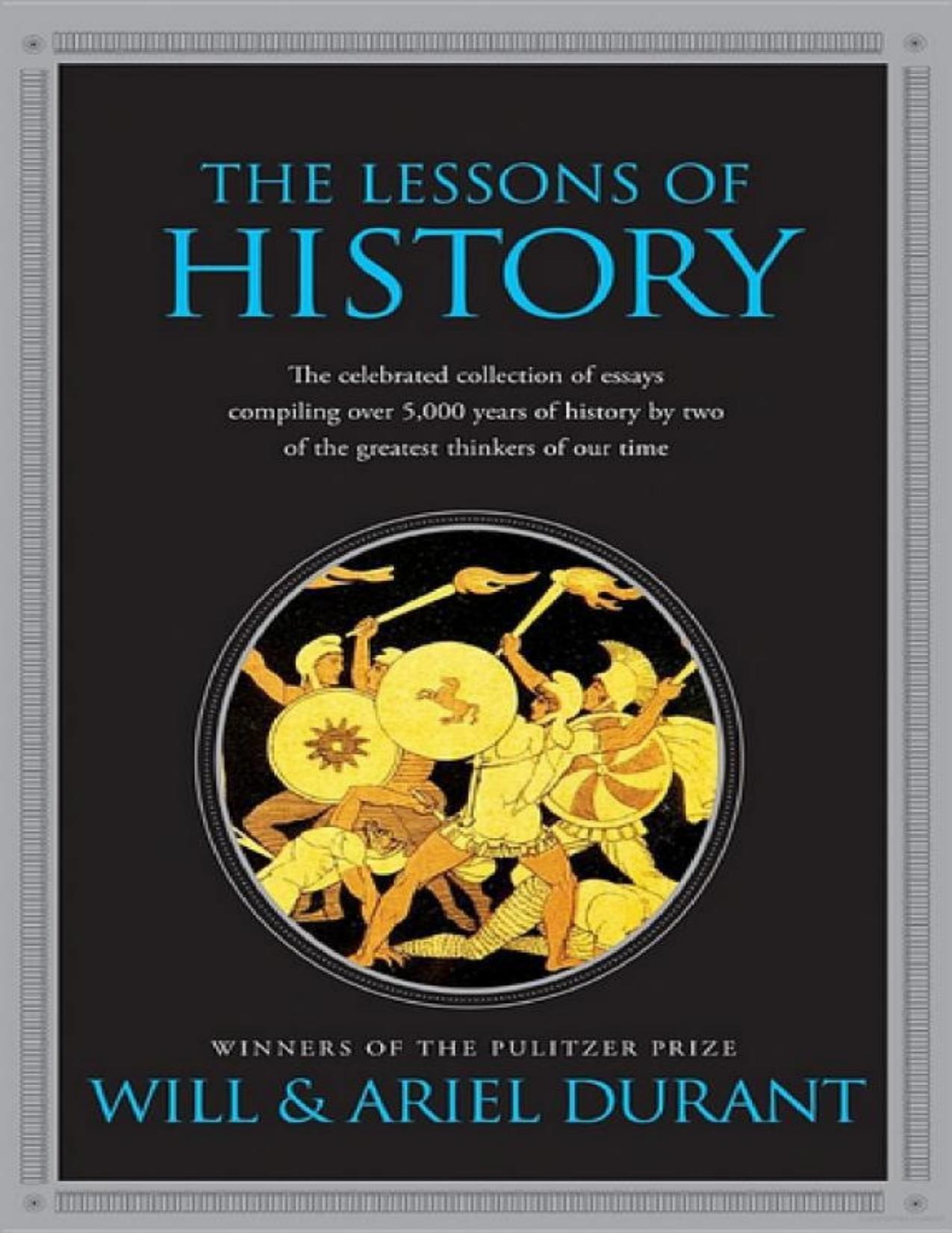The Lessons of History by Will Durant & Ariel Durant

Author:Will Durant & Ariel Durant [Durant, Will & Durant, Ariel]
Language: eng
Format: mobi, epub, azw3, pdf
Tags: Decline, Character, Religion, Socialism, Civilization, Progress, History & Surveys, War, Europe, Biology, Government, Philosophy, World, Ariel Durant, Economics, Race, History, Morals, Western History, General, Culture, Growth, Will Durant, History; Western History; Culture; Europe; Will Durant; Ariel Durant; Biology; Race; Character; Morals; Religion; Economics; Socialism; Government; War; Growth; Decline; Progress
ISBN: 9781439170199
Google: LWNQ2_4wkocC
Publisher: Simon and Schuster
Published: 2012-08-20T18:30:00+00:00
intellectual liberty? Has all the progress of philosophy since Descartes been a mistake through its failure to recognize the role of myth in the consolation and control of man? "He that increaseth knowledge increaseth sorrow, and in much wisdom is much grief." 74
Has there been any progress at all in philosophy since Confucius? Or in literature since Aeschylus? Are we sure that our music, with its complex forms and powerful orchestras, is more profound than Palestrina, or more musical and inspiring than the monodic airs that medieval Arabs sang to the strumming of their simple instruments? (Edward Lane said of the Cairo musicians, "I have been more charmed with their songs . . . than with any other music that I have ever enjoyed." 75 ) How does our contemporary architecture— bold, original, and impressive as it is—compare with the temples of ancient Egypt or Greece, or our sculpture with the statues of Chephren and Hermes, or our bas-reliefs with those of Persepolis or the Parthenon, or our paintings with those of the van Eycks or Holbein? If "the replacement of chaos with order is the essence of art and civilization, ,, 76 is contemporary painting in America and Western Europe the replacement of order with chaos, and a vivid symbol of our civilization's relapse into confused and structureless decay?
History is so indifferently rich that a case for almost any conclusion from it can be made by a selection of instances. Choosing our evidence with a brighter bias, we might evolve some more comforting reflections. But perhaps we should first define what progress means to us. If it means increase in happiness its case is lost almost at first sight. Our capacity for fretting is endless, and no matter how many difficulties we surmount, how many ideals we realize, we shall always find an excuse for being magnificently miserable; there is a stealthy pleasure in rejecting mankind or the universe as unworthy of our approval. It seems silly to define progress in terms that would make the average child a higher, more advanced product of life than
the adult or the sage—for certainly the child is the happiest of the three. Is a more objective definition possible? We shall here define progress as the increasing control of the environment by life. It is a test that may hold for the lowliest organism as well as for man.
We must not demand of progress that it should be continuous or universal. Obviously there are retrogressions, just as there are periods of failure, fatigue, and rest in a developing individual; if the present stage is an advance in control of the environment, progress is real. We may presume that at almost any time in history some nations were progressing and some were declining, as Russia progresses and England loses ground today. The same nation may be progressing in one field of human activity and retrogressing in another, as America is now progressing in technology and receding in the graphic arts. If we find that
Download
The Lessons of History by Will Durant & Ariel Durant.epub
The Lessons of History by Will Durant & Ariel Durant.azw3
The Lessons of History by Will Durant & Ariel Durant.pdf
This site does not store any files on its server. We only index and link to content provided by other sites. Please contact the content providers to delete copyright contents if any and email us, we'll remove relevant links or contents immediately.
| Civilization & Culture | Expeditions & Discoveries |
| Jewish | Maritime History & Piracy |
| Religious | Slavery & Emancipation |
| Women in History |
Cecilia; Or, Memoirs of an Heiress — Volume 1 by Fanny Burney(32544)
Cecilia; Or, Memoirs of an Heiress — Volume 2 by Fanny Burney(31942)
Cecilia; Or, Memoirs of an Heiress — Volume 3 by Fanny Burney(31928)
The Secret History by Donna Tartt(19047)
Sapiens: A Brief History of Humankind by Yuval Noah Harari(14366)
Leonardo da Vinci by Walter Isaacson(13315)
The Radium Girls by Kate Moore(12017)
Sapiens by Yuval Noah Harari(5365)
How Democracies Die by Steven Levitsky & Daniel Ziblatt(5213)
The Wind in My Hair by Masih Alinejad(5091)
Homo Deus: A Brief History of Tomorrow by Yuval Noah Harari(4906)
Endurance: Shackleton's Incredible Voyage by Alfred Lansing(4768)
Man's Search for Meaning by Viktor Frankl(4579)
The Silk Roads by Peter Frankopan(4525)
Millionaire: The Philanderer, Gambler, and Duelist Who Invented Modern Finance by Janet Gleeson(4464)
The Rape of Nanking by Iris Chang(4202)
Joan of Arc by Mary Gordon(4099)
The Motorcycle Diaries by Ernesto Che Guevara(4089)
Stalin by Stephen Kotkin(3956)
